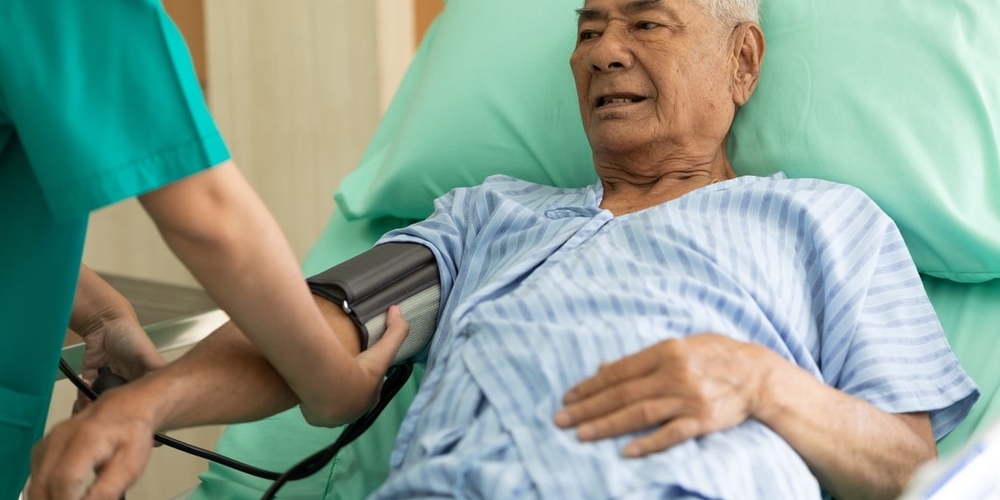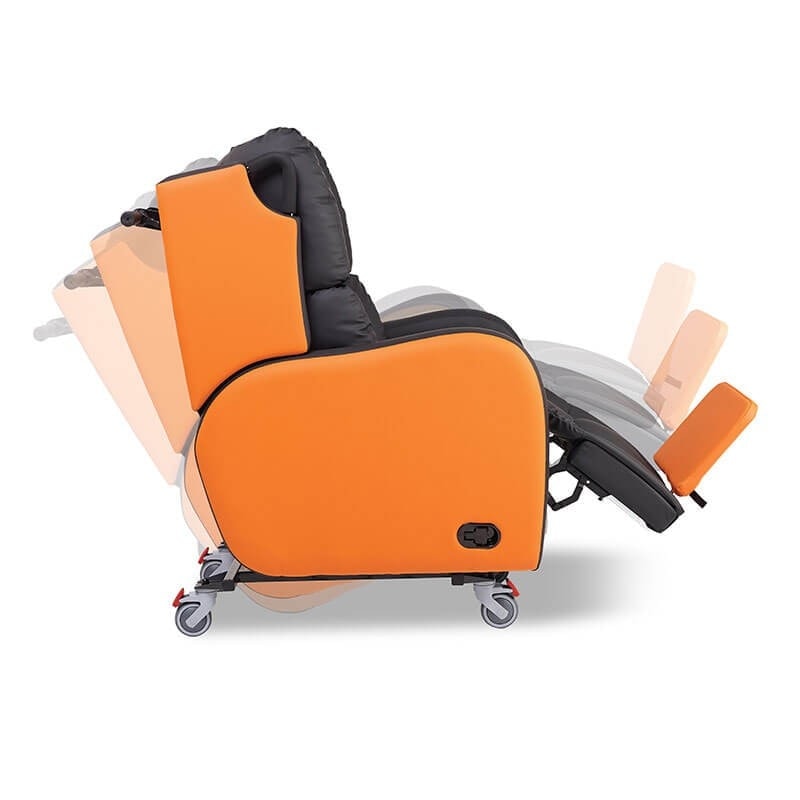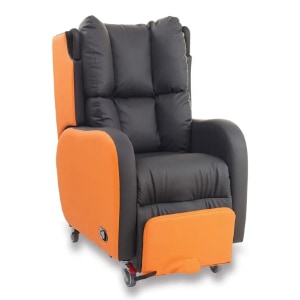Benefits of Specialist Seating for Healthcare Professionals & Hoisted Patients

Specialist seating is designed for individuals with reduced mobility, which may result from chronic conditions, injury, or the natural effects of ageing. There are different types of specialist seating, designed to match the needs of each individual. Hospitals, rehabilitation centres, care homes and other healthcare settings provide specialist seating to aid patients and healthcare professionals.
How Does Specialist Seating Improve Patient Wellbeing & Reduce Pain?
Individuals with reduced mobility are typically seated for extended periods in limited positions, which can result in pressure sores, poor postural management, discomfort, body shape distortion and fatigue. Specialist seating acts as a vital postural support that benefits the physiological condition of a person, ultimately improving the quality of their life. The right seating solution will offer the following:
- Enhanced Comfort: Specialist seating provides tailored support that reduces pressure points and discomfort, particularly for those who spend long periods seated.
- Improved Posture: Proper alignment reduces the risk of musculoskeletal problems and promotes better breathing and digestion.
- Pressure Relief: Designed to minimise the risk of pressure ulcers by evenly distributing weight and allowing for regular repositioning.
- Increased Independence: Features such as tilt-in-space or motorised controls can empower users to adjust their position without assistance, promoting autonomy.
- Better Circulation: Encourages movement and positioning that support healthy blood flow, especially in the legs and lower body
- Enhanced Safety: Reduces the risk of falls and injuries through secure positioning, stable bases, and appropriate support structures.
- Positive Mental Health: Greater physical comfort and independence can lead to improved mood, reduced anxiety, and a better overall sense of well-being.
- Lower Rate of Patient Surgeries: According to guidance from Public Health England, early intervention through postural care can prevent the need for surgery, alongside further stress on the body.

The Consequences of Incorrect Postural Support
Incorrect seating and inadequate postural management can have significant consequences for both patients and the carers or healthcare professionals supporting them. These issues not only affect the health and wellbeing of individuals with mobility challenges but also place additional physical, emotional, and financial burdens on those providing care.
Impact on Patient Care: Physiological & Emotional
For individuals who are unable to maintain their posture or reposition themselves, a lack of appropriate seating can have serious health implications. Without postural support, the body can begin to lose its natural shape, affecting vital functions such as breathing and digestion. Over time, this can lead to complications including pressure injuries, constipation, choking, joint contractures, hip dislocation, and skin breakdown.
The emotional impact can be just as significant. Persistent discomfort, limited movement, and a growing reliance on others can lead to feelings of frustration, isolation, and low mood, particularly for those who find it difficult to express how they feel.
Together, these physical and emotional challenges not only reduce a person’s quality of life but also place greater demands on care teams and healthcare services.
Pressure on NHS Staff, Carers and Healthcare Professionals
When patients lack appropriate seating, carers often need to perform more frequent and strenuous manual handling tasks, such as repositioning or assisting with transfers. This elevates the risk of musculoskeletal injuries among carers.
Carers may also find manual handling tasks time-consuming in care homes and hospital environments. This can lead to a comprise in care quality as each carer will have a certain amount of residents to see each day. Ultimately, it diverts time and resources away from other patients.
Managing patients with deteriorating conditions due to poor postural support can also lead to increased stress levels among carers and healthcare professionals. The emotional toll of witnessing patient discomfort, coupled with the physical demands of care, can contribute to burnout and decreased job satisfaction.
Increased Costs for the NHS
Patients suffering from complications due to inadequate seating often require extended hospital stays, surgical interventions, and increased use of medical equipment. This places additional strain on NHS resources, potentially affecting the availability of care for other patients.
The financial implications of poor postural management are substantial. According to NHS England, treating a full-thickness sacral pressure ulcer can be as costly as performing 16 total hip replacements. In 2013, the NHS spent approximately £4 billion on treating pressure ulcers, some of which could have been prevented with appropriate seating solutions.
Benefits of Specialist Seating for Healthcare Professionals and Hoisted Patients
Specialist seating plays an important role in healthcare settings. It not only improves comfort and wellbeing for patients but also supports carers and healthcare professionals in their daily routines. For patients who are hoisted or have complex mobility needs, specialist recliner chairs can reduce the number of transfers required throughout the day while providing safe, supported positioning.

Benefits of Specialist Seating for Healthcare Professionals
Specialist seating reduces the need for frequent manual handling through features such as tilt, recline and powered adjustments. This helps to lower physical strain on carers. With built-in support for posture and pressure relief, staff spend less time repositioning individuals and more time delivering other areas of care. Many chairs also work well with hoists or include integrated transfer aids, making movement safer and easier.
Stable seating that supports the body can also improve breathing, digestion and skin health, helping professionals to meet important clinical goals. It ensures consistency in care, even across different shifts or teams. For carers and clinicians, knowing that a person is well supported brings reassurance and confidence in the quality of care being provided.
Over time, investing in specialist seating can also reduce the need for more costly interventions such as surgery, equipment for mobility, medication or adaptations to the home.
Benefits of Specialist Seating for Hoisted Patients
For people who rely on hoists for movement, specialist recliners can reduce the need for multiple transfers each day by offering a safe and comfortable place to remain seated. This helps to maintain posture, prevent complications such as pressure injuries, and improve the overall experience of care.
Unlike hoists, which are used for moving someone from one location to another, specialist seating provides ongoing support throughout the day. It promotes comfort, reduces anxiety, and helps maintain a sense of dignity. It also makes care less physically demanding, as the person can be repositioned easily and often with less assistance.
By combining comfort with clinical support, specialist seating offers a more complete and person-centred approach for individuals who require hoisting.
Best Recliner Chair for Hoisted Patients
Boston Porter Chair
Our Boston Porter chair is excellent for a 24-hour care programme with interchangeable seat and back cushions (each with its own pressure management features) and extensive movements available.
The Boston recliner is designed to support effective pressure management and postural care. It allows independent adjustment of the tilt-in-space, backrest recline, and leg rest elevation, offering a range of positions to meet individual needs. These functions enable carers to regularly reposition the user, helping to redistribute pressure and maintain comfort throughout the day.
This chair also has wing handles so that when the chair is tilted, the caregiver can still porter the client without having to bend to use the push handle, which is beneficial for both the caregiver and client.
The Boston is ideal for life limiting conditions, palliative care, deteriorating conditions and those clients with have issues with agitation and wandering:
- Parkinson’s Disease
- Motor Neurone disease
- Dementia
- Multiple diagnoses
FAQs for Specialist Seating for Healthcare
Hoists are mechanical devices designed to safely lift and transfer individuals who have limited mobility or are unable to move independently. They are commonly used in healthcare settings, care homes, and private residences to assist with tasks such as moving a person from a bed to a chair, from a chair to a toilet, or even into a bath or pool.
